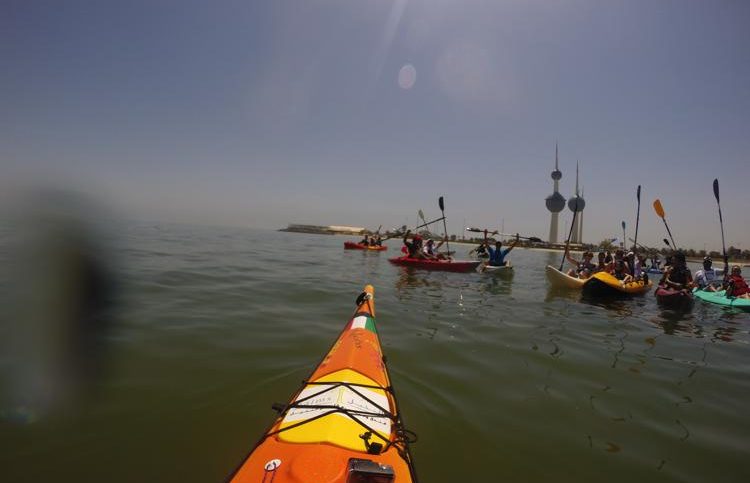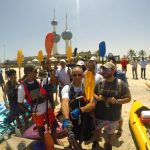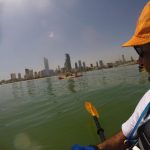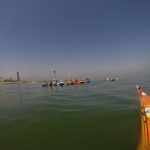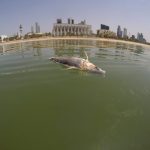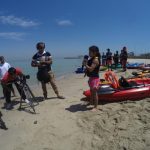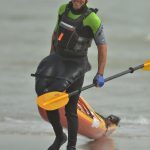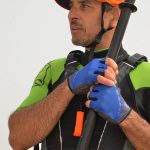An avid fan of the outdoors, Bashar Al Huneidi has sustained his passion and kayaking hobby ever since he brought back his Kayak from the United States in 1990. At the same time, he had since noticed the deterioration of the quality of Kuwait’s marine life and the rapid pace in which this is occurring. For that cause, he thought that kayaking would be a useful way to tackle this issue, especially since the kayaking scene has grown tremendously in recent years and for that reason he decided to put his kayaking skills to great use—raising awareness about the health of Kuwait’s sea and marine life by engaging others in a fun water activity that is accessible to people from all walks of life.
The message conveyed through Kayak4Kuwait is one that is shared by many people: Sustaining Kuwait’s natural treasures and preserving the country’s national sea heritage. Bashar is an enthusiastic outdoorsman for more than thirty years. From hiking, rafting, kayaking to scuba diving, he enjoys activities that allow him to enjoy the raw and untouched beauty that nature offers. Yet with time, he noticed that the way in which we treat our waters is deteriorating at an alarming speed. Bashar told bazaar, “We appreciate nature, utilize the resources it offers, without giving back. We must leave nature as if we were never there, as this is our legacy for future generations. Kuwait’s marine culture will surely perish in our time, if we do not take action today.” His concerns are perfectly legitimate, and we have noticed this in recent years, where the fishing season is not what it used to be, and the complaints about the trash that washes ashore the coast and surrounding islands are on the rise. Yet many of us remain complacent. From highly polluted water levels that are visible to the naked eye, and could even be smelled, harming the marine ecosystems, to forgotten fishing cages (the hazardous Gargoor), Bashar documents the ecological turmoil seen by the Kayak4Kuwait team on Instagram and other media outlets. Through this awareness activity, where more and more people are taking a cue from his efforts, Bashar hopes to elicit a response from the people who see the posts.
After kayaking to Failaka Island last October, a round trip that totaled 11 hours, Bashar noticed various spots of Red Tide, also recognized as the discoloration of seawater caused by a bloom of toxic red algae, and documented this phenomena on the Kayak4Kuwait Instagram account. His trip garnered the attention of various media outlets, and this encouraged him to continue his mission. He said, “People enjoy kayaking, so I thought it would be useful to raise awareness about these issues through an activity that people generally have fun doing.” The most recent Kayak4Kuwait trip took the team from the Parliament toward Kuwait Towers, where floating dead fish disrupted what was supposed to be a leisurely trip along the coastline. The smell of the sea, stomach turning to say the least, is a disappointment in and of itself. This, sadly, is not a new sight for Bashar, who has seen this happen many times before. He recounts tales of Kuwait’s history, where the pearl diving nation emerged and flourished by the sea. He said, “We depended on the sea for pearl diving and fishing. As our country evolved, our dependence grew on the sea in terms of trade and shipping, and even to this day, Kuwait enjoys an active beach and sea lifestyle.
What we succeeded to do, however, is abuse the natural balance of the marine ecosystem. We continue to take the sea for granted without paying any attention to the consequences and without giving back. If we continue to pollute, our seas don’t even have a fighting chance.”
The Kayak4Kuwait team has so far witnessed various types of extremely dangerous practices that are causing our seas to become highly polluted.
- A regular practice that should be deemed illegal immediately is the anchoring of boats we commonly see around Kubbar Island. Bashar explained, “These anchors, when dropped into the sea bed thoughtlessly, ruin the reefs below the water, ultimately disrupting the underwater lifecycle.” As a solution, buoys were made available around the islands by volunteers so that people can tie their boats to them, rather than throw a hefty and damaging anchor.
- Another extremely alarming polluting activity seen by the Kayak4Kuwait team includes the countless unregulated fishing cages (Gargoor) and fishing trolleys. This time, the culprit is greed, as many fishing companies and fishermen opt to utilize colossal quantities of large fishing trolleys, huge nets that are cast deep into the water. Bashar said, “A lot of the time, fishermen take large amounts of fishing trolleys out in the sea and use it to capture as many fish as they possibly could. When forgotten, or lost, fish and other sea creatures get caught in them and are left to die.” Bashar even calls these nets ‘weapons of mass destruction’, as the unregulated trolleys, that are different from the harmful metal cages (Gargoor), gather everything at the bottom of the seabed without discrimination, destroying entire ecosystems in the process without paying heed to the already existing marine biology. What actually happens in these situations is that due to the large amounts of fishing trolleys and cages employed, it is common that the fishermen either forget where these nets were placed, or they become lost or deteriorate due to a lack of maintenance on the part of the fishermen.
- Another polluting activity that continues to take place and goes by unnoticed and neglected, is the disposal of Ballast water from incoming empty ship liners. This amount is insurmountable, and the waters contain not only harmful oils, yet they also contain external species to the local water habitat that are foreign to our waters, further disrupting the life cycles of our own marine ecosystems.
All of these abuses are very real and the repercussions are seriously damaging. The activities stem from a variety of reasons, many of which most definitely include complacency and neglect on our parts, along with ignorance and greed on the part of many others. More importantly, many of these practices are documented by the Kayak4Kuwait team via social media, throughout their many journeys around Kuwait’s coast. Bashar added, “It’s not just us, everyone sees these issues, yet perhaps involving the youth in Kayaking will nurture a new perspective. I seek the attention and aid of the individual to work together to find a solution; I am not after anything else. If I can convince the individual, then I’ve succeeded in making the solution in the hands of individuals and not only one person. If we look at the sea as a person, a friendly giant, rather than a vast entity that is never-ending, then we will realize that by harming one part of this person, the entire being is affected.” [cont…]
[continued…] Bashar further highlighted the different types of pollution that we see on a daily basis:
- Personal littering, where we regularly see people at the beach or on their boats disposing of waste with no repercussions. A large fine, if correctly applied, would easily mostly eliminate this type of pollution.
- Commercial entities should also be held accountable for their actions. He said, “Fishing companies and ship liners are not regulated in how they dispose of their waste, and fishing companies employ the use of illegal nets. It’s disturbing that we see this on a regular basis, and people have grown accustomed to these actions.” While Bashar does acknowledge that legislation doesn’t happen overnight, he truly hopes that Kayak4Kuwait will garner the attention of the right people, whether government officials or company owners, so that perhaps a small CSR initiative will snowball into a national campaign against greedy fishing practices that are taking Kuwait’s natural treasures for granted.
- Governmental littering, where the concerning polluting factors include heat pollution coming from the local power plants, where the immediate heat emanating from the power plants kill the surrounding marine life due to the increased temperatures of the seawater. Other issues include the inappropriate disposal of sewage that directly results in poisoning the seas with waste products and other severely damaging chemicals.
All of the team’s efforts boil down to one successful strategy, and this entails targeting people from different walks of life to help give their wide and varying capabilities.
Littering is a behavior; it is a challenge to normal social standards of behavior. Bashar stresses that this is social issue, rather than a personal choice, and by educating people to act otherwise is the key factor. From there, the Kayak4Kuwait team leads by example. Through kayaking, they utilize it as an opportunity to explore our country’s natural beauty. The sport can be practiced almost all year round, and it is especially cold-weather and rough-weather friendly, which means that the season typically starts after the summery chalet season. You get to breathe in clean, seawater air, and you can go in a group or solo. Kayak4Kuwait, nonetheless, stresses the importance of safe kayaking practices, where the team doesn’t carry out a trip without the required safety gear. Bashar is keen on teaching those who join the different enjoyable aspects from the sport, especially that you can cross long distances in a challenging manner, and it serves as an amazing upper body workout. Bashar also encourages everyone to join because the kayaks now available in Kuwait are super easy to use, and you will soon feel challenged to upgrade your first kayak to a larger one that can also be used on kayaking trips abroad.
According to Bashar, the response so far has been overwhelmingly positive, as he is overjoyed by not only how kayakers respond to seeing their homeland from the sea, yet every one who has come on board to raise awareness is staggered by what they keep discovering about Kuwait’s deteriorating sea waters. The team also plans on speaking to the government in the near future to see how different MP’s can actively support and implement new legislature that will help preserve and rescue Kuwait’s marine life.
One might ask, ‘If I am not a kayaker, how could I possibly help?’ This problem can easily be remedied, as everyone and anyone can help. People can get involved in different ways, whether media outlets, lawyers, environmentalists, or even your average Joe and the Kuwaiti household. It all begins with not only education, yet taking action to actively involve people and leading by example. Just like the amazing team behind Kayak4Kuwait, you don’t need to wait for someone to elicit change because you can do it yourself.
This amazing initiative combines the love of adventure with a cause, and through their efforts we have come to learn so much about the different polluting factors that surround us on a daily basis. We’ve almost become numb to these horrific changes. The Kayak4Kuwait team has refreshed our passions, and re-energized our zest for life, simply by taking us on a fun ride across Kuwait’s coastline. While Bashar always found it difficult to refrain from angrily reprimand those who hastily pollute, he understands the importance of patience, and showing people a different choice by encouraging positive behavior. He leaves us with one motivational conclusion, “If any of the issues that I’ve mentioned or posted about on Instagram are tackled, then we would have tackled so much more than what people could fathom.”
The Kayak4Kuwait team aims to create awareness and trigger actions to help the sea survive to allow future generations to enjoy its natural treasures. All kayakers or anyone with a kayak can join. Follow @Kayak4Kuwait on Instagram for more information.

